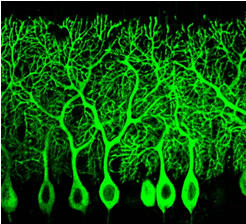Cellular Biophysics
Staffs
Naohide Hirashima, Ph.D., Professor
Masahiko Tanaka, Ph.D., Associate Professor
Masahiko Tanaka, Ph.D., Associate Professor
Research Project
- Mechanism of Exocytosis
- Analysis of Allergic Responses
- Mechanism of Neural Development
- Development of Visualization Methods for Cellular Responses
The mission of our lab is to elucidate the mechanism of cellular responses observed in immune and nervous systems. As for immune system, we are interested in the mechanism of allergic responses, especially in the involvement of mast cell. Mast cell secretes inflammatory mediators that cause allergic responses. We found that SNARE proteins are involved in exocytic secretion and their accessory proteins such as complexin II and Munc18-2 regulates exocytosis positively in mast cells.
As for nervous system, we are interested in the mechanism of dendrite formation of neurons, which is an important phenomenon for formation and function of neural networks. Especially, we are investigating molecular and cellular mechanisms regulating dendrite formation of cerebellar Purkinje cells, using various techniques of cell biology, molecular biology and biophysics.
(1) Mast cell is a key player in allergic responses. Mast cell has many vesicles called secretory granules that contain inflammatory mediators such as histamine. Upon stimulation, mast cells secrete those mediators by exocytosis. Therefore, we have investigated signal transduction from receptor stimulation to exocytic secretion (stimulus-secretion coupling).
As for nervous system, we are interested in the mechanism of dendrite formation of neurons, which is an important phenomenon for formation and function of neural networks. Especially, we are investigating molecular and cellular mechanisms regulating dendrite formation of cerebellar Purkinje cells, using various techniques of cell biology, molecular biology and biophysics.
(1) Mast cell is a key player in allergic responses. Mast cell has many vesicles called secretory granules that contain inflammatory mediators such as histamine. Upon stimulation, mast cells secrete those mediators by exocytosis. Therefore, we have investigated signal transduction from receptor stimulation to exocytic secretion (stimulus-secretion coupling).

Secretory granules fused with the plasma membrane to secrete their intra-granular contents.

(2) Cerebellar Purkinje cells form the most elaborate dendritic trees among neurons in the CNS. We are investigating roles of neurotransmitters, Ca channels, kinases, phosphatases and neuron-glia interaction molecules in dendrite formation of Purkinje cells, using various techniques such as cell and slice culture, regulation of gene expression and imaging of living cells.

